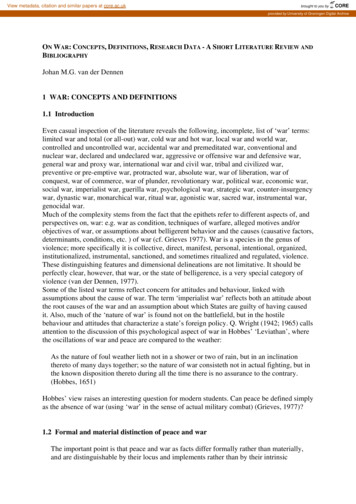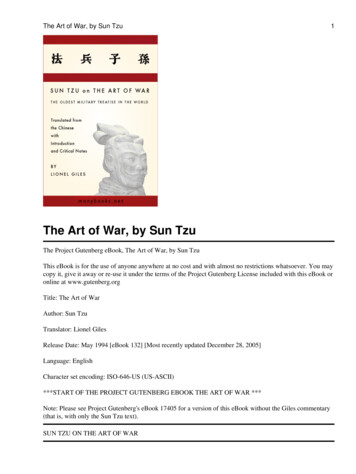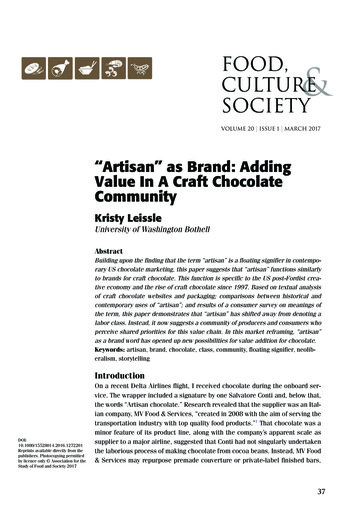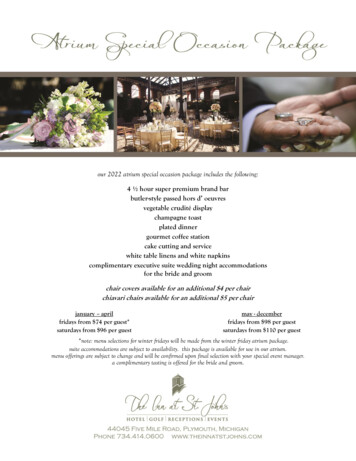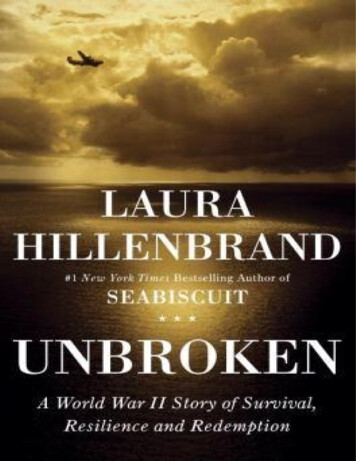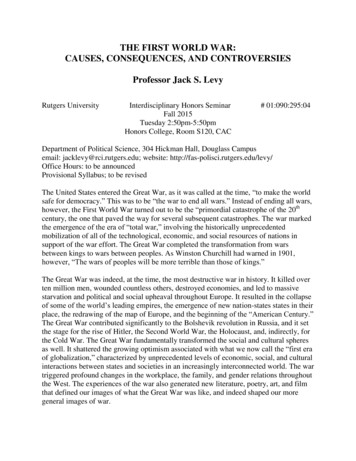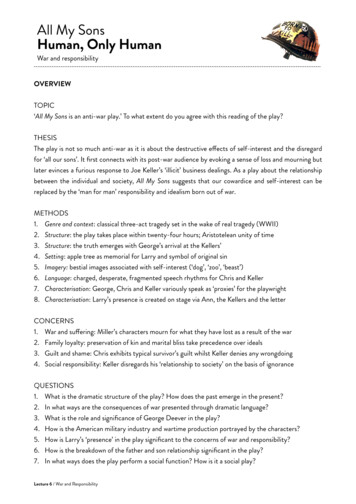
Transcription
8 LITERATURE
8 LITERATURETHE CHOCOLATE WARBy: Robert CormierThis one's for my son, Peter.With love.CHAPTER ONEThey murdered him.As he turned to take the ball, a dam burst against the side of his head and ahand grenade shattered his stomach. Engulfed by nausea, he pitched toward the grass.His mouth encountered gravel, and he spat frantically, afraid that some of his teethhad been knocked out. Rising to his feet, he saw the field through drifting gauze butheld on until everything settled into place, like a lens focusing, making the worldsharp again, with edges.The second play called for a pass. Fading back, he picked up a decent block andcocked his arm, searching for a receiver--- maybe the tall kid they called The Goober.Suddenly, he was caught from behind and whirled violently, a toy boat caught in awhirlpool. Landing on his knees, hugging the ball, he urged himself to ignore the painthat gripped his groin, knowing that it was important to betray no sign of distress,remembering The Goober's advice; "Coach is testing you, testing, and he's looking forguts."I've got guts, Jerry murmured, getting up by degrees, careful not to displace anyof his bones or sinews. A telephone rang in his ears. Hello, hello, I'm still here. Whenhe moved his lips, he tasted the acid of dirt and grass and gravel. He was aware of theother players around him, helmeted and grotesque, creatures from an unknown world.He had never felt so lonely in his life, abandoned, defenseless.On the third play, he was hit simultaneously by three of them: one, his knees;another, his stomach; a third, his head--- the helmet no protection at all. His bodyseemed to telescope into itself but all the parts didn't fit, and he was stunned by theknowledge that pain isn't just one thing--- it is cunning and various, sharp here andsickening there, burning here and clawing there. He clutched himself as he hit theground. The ball squirted away. His breath went away, like the ball--- a terriblestillness pervaded him--- and then, at the onset of panic, his breath came back again.His lips sprayed wetness and he was grateful for the sweet cool air that filled hislungs. But when he tried to get up, his body mutinied against movement. He decidedthe hell with it. He'd go to sleep right here, right out on the fifty yard line, the hell2
with trying out for the team, screw everything, he was going to sleep, he didn't careanymore."Renault!"Ridiculous, someone calling his name."Renault!"The coach's voice scraped like sandpaper against his ears. He opened his eyesflutteringly. "I'm all right," he said to nobody in particular, or to his father maybe. Orthe coach. He was unwilling to abandon this lovely lassitude but he had to, of course.He was sorry to leave the earth, and he was vaguely curious about how he was goingto get up, with both legs smashed and his skull battered in. He was astonished to findhimself on his feet, intact, bobbing like one of those toy novelties dangling from carwindows, but erect."For Christ's sake," the coach bellowed, his voice juicy with contempt. A spurtof saliva hit Jerry's cheek.Hey, coach, you spit on me, Jerry protested. Stop the spitting, coach. What hesaid aloud was, "I'm all right, coach," because he was a coward about stuff like that,thinking one thing and saying another, planning one thing and doing another--- he hadbeen Peter a thousand times and a thousand cocks had crowed in his lifetime."How tall are you, Renault?""Five nine," he gasped, still fighting for breath."Weight?""One forty-five," he said, looking the coach straight in the eye."Soaking wet, I'll bet," the coach said sourly. "What the hell you want to playfootball for? You need more meat on those bones. What the hell you trying to playquarterback for? You'd make a better end. Maybe."The coach looked like an old gangster: broken nose, a scar on his cheek like astitched shoestring. He needed a shave, his stubble like slivers of ice. He growled andswore and was merciless. But a helluva coach, they said. The coach stared at himnow, the dark eyes probing, pondering. Jerry hung in there, trying not to sway,trying,not to faint."All right," the coach said in disgust. "Show up tomorrow. Three o'clock sharpor you're through before you start."Inhaling the sweet sharp apple air through his nostrils--- he was afraid to openhis mouth wide, wary of any movement that was not absolutely essential--- he walkedtentatively toward the sidelines, listening to the coach barking at the other guys.Suddenly, he loved that voice, "Show up tomorrow."He trudged away from the field, blinking against the afternoon sun, toward thelocker room at the gym. His knees were liquid and his body light as air, suddenly.Know what? he asked himself, a game he played sometimes.What?3
I'm going to make the team.Dreamer, dreamer.Not a dream: it's the truth.As Jerry took another deep breath, a pain appeared, distant, small--- a radarsignal of distress. Bleep, I'm here. Pain. His feet scuffled through crazy cornflakeleaves. A strange happiness invaded him. He knew he'd been massacred by theoncoming players, capsized and dumped humiliatingly on the ground. But he'dsurvived--- he'd gotten to his feet. "You'd made a better end." Was the Coach thinkinghe might try him at end? Any position, as long as he made the team. The bleep grewlarger, localized now, between his ribs on the right side. He thought of his mother andhow drugged she was at the end, not recognizing anyone, neither Jerry nor his father.The exhilaration of the moment vanished and he sought it in vain, like seekingecstasy's memory an instant after jacking off and encountering only shame and guilt.Nausea began to spread through his stomach, warm and oozy and evil."Hey," he called weakly. To nobody. Nobody there to listen.He managed to make it back to the school. By the time he had sprawled himselfon the floor of the lavatory, his head hanging over the lip of the toilet bowl and thesmell of disinfectant stinging his eyeballs, the nausea had passed and the bleep of painhad faded. Sweat moved like small moist bugs on his forehead.And then, without warning, he vomitedCHAPTER TWOObie was bored. Worse than bored. He was disgusted. He was also tired. Itseemed he was always tired these days. He went to bed tired and he woke up tired. Hefound himself yawning constantly. Most of all, he was tired of Archie. Archie thebastard. The bastard that Obie alternately hated and admired. For instance, at thisminute he hated Archie with a special burning hate that was part of the boredom andthe weariness. Notebook in hand, pencil poised, Obie looked at Archie now withfierce anger, furious at the way Archie sat there in the bleachers, his blond hairtossing lightly in the breeze, enjoying himself, for crying out loud, even though heknew that Obie would be late for work and yet keeping him here, stalling, killingtime."You're a real bastard," Obie said finally, his frustration erupting, like a cokeexploding from a bottle after you shake it. "You know that?"Archie turned and smiled at him benevolently, like a goddam king passing outfavors."Jesus," Obie said, exasperated."Don't swear, Obie," Archie chided. "You'll have to tell it in confession."4
"Look who's talking. I don't know how you had the nerve to receivecommunion at chapel this morning.""It doesn't take nerve, Obie. When you march down to the rail, you're receivingThe Body, man. Me, I'm just chewing a wafer they buy by the pound in Worcester."Obie looked away in disgust."And when you say 'Jesus,' you're talking about your leader. But when I say'Jesus,' I'm talking about a guy who walked the earth for thirty-three years like anyother guy but caught the imagination of some PR cats. PR for Public Relations, incase you don't know, Obie."Obie didn't bother to answer. You couldn't ever win an argument with Archie.He was too quick with the words. Especially when he fell into one of his phony hipmoods. Saying man and cat, like he was a swinger, cool, instead of a senior in a lousylittle high school like Trinity."Come on, Archie, it's getting late," Obie said, trying to appeal to Archie'sbetter nature. "I'm going to get fired one of these days.""Don't whine, Obie. Besides, you hate the job. You have a subconscious wishto be fired. Then you wouldn't have to stock the shelves any more or take crap fromcustomers or work late Saturday night instead of going to the--- what is it you goto?--- the Teen-Age Canteen to drool over all those broads."Archie was uncanny. How did he know Obie hated the stupid job? How did heknow that Obie hated especially those Saturday nights stalking the supermarketcanyons while everybody else was at the canteen?"See? I'm doing you a favor. Enough of these late afternoons and the boss'llsay, 'You're all done, Obie baby. Set free.' And you'll have one, right in front of him.""And where'll my money come from?" Obie asked.Archie waved his hand, signaling that he was tired of the conversation. Youcould see him physically withdraw although he was only a foot or two away fromObie on the bleacher bench. The shouts of the fellows from the football field belowechoed feebly in the air. Archie's lower lip dropped. That meant he was concentrating.Thinking. Obie waited in anticipation, hating the thing in him that made him look atArchie in admiration. The way Archie could turn people on. Or off. The way he coulddazzle you with his brilliance--- those Vigil assignments that had made himpractically a legend at Trinity--- and the way he could disgust you with his cruelties,those strange offbeat cruelties of his, that had nothing to do with pain or violence butwere somehow even worse. It made Obie uncomfortable to think of that stuff and heshrugged the thoughts away, waiting for Archie to talk, to say the name."Stanton," Archie said finally, whispering the name, caressing the syllables. "Ithink his first name is Norman.""Right," Obie said, scrawling the name. Only two more to go. Archie had tocome up with ten names by four o'clock and eight were now listed on Obie's pad.5
"The assignment?" Obie prodded."Sidewalk."Obie grinned as he wrote the word. Sidewalk: such an innocent word. But whatArchie could do with simple things like a sidewalk and a kid like Norman Stantonwhom Obie recalled as a blustering bragging character with wild red hair and eyelidsmatted with yellow crap."Hey, Obie," Archie said."Yeah?" Obie asked, on guard."You really going to be late for work? I mean--- would you really lose yourjob?" Archie's voice was soft with concern, his eyes gentle with compassion. That'swhat baffled everyone about Archie--- his changes of mood, the way he could be awise bastard one minute and a great guy the neat."I don't think they'd actually fire me. The guy who owns the place, he's a friendof the family. But I mean getting there late doesn't, like, help the cause. I'm overduefor a raise but he's holding it back until I get on the ball."Archie nodded, all businesslike. "All right, we'll wrap it up. We'll get you onthe ball. Maybe I ought to assign someone to the store, and make life interesting foryour boss.""Jeez, no," Obie said quickly. He shivered with dread, realizing how awesomeArchie's power really was. Which is why you had to stay on the good side of thebastard. Buy him Hersheys all the time to satisfy his craving for chocolate. ThankGod Archie didn't go in for pot or that stuff--- Obie would have had to become apusher, for crying out loud, to supply him. Obie was officially the secretary of TheVigils but he knew what the job really demanded. Carter, the president who wasalmost as big a bastard as Archie, said, "keep him happy; when Archie's happy, we'reall happy.""Two more names," AFchie mused now. He rose and stretched. He was tall andnot too heavy. He moved with a subtle rhythm, languidly, the walk of an athletealthough he hated all sports and had nothing but contempt for athletes. Particularlyfootball players and boxers, which happened to be Trinity's two major sports. Usually,Archie didn't pick athletes for assignments--- he claimed they were too stupid toabsorb the delicate shadings, the subtle intricacies involved. Archie dislikedviolence--- most of his assignments were exercises in the psychological rather thanthe physical That's why he got away with so much. The Trinity brothers wanted peaceat any price, quiet on the campus, no broken bones. Otherwise, the sky was the limit.Which was right up Archie's alley."The kid they call The Goober," Archie said now.Obie wrote down "Roland Goubert.""Brother Eugene's room."Obie smiled in delicious malice. He liked it when Archie involved the brothers6
in the assignments. Those were the most daring, of course. And someday Archiewould go too far and trip himself up. In the meantime, Brother Eugene would do. Hewas a peaceful sort, made to order for Archie, naturally.The sun vanished behind floating clouds. Archie brooded, isolating himselfagain. The wind rose, kicking puffs of dust from the football field. The field neededseeding. The bleachers also needed attention--- they sagged, peeling paint like leprosyon the benches. The shadows of the goal posts sprawled on the field like grotesquecrosses. Obie shivered."What the hell do they think I am?" Archie asked.Obie remained silent. The question didn't seem to require an answer. It was asif Archie was talking to himself."'These goddam assignments," Archie said. "Do they think it's easy?" His voicedripped sadness. "And the black box."Ohie yawned. He was tired. And uncomfortable. He always yawned and gottired and uncomfortable when he found himself in situations like this, not knowinghow to proceed, surprised at the anguish in Archie's voice. Or was Archie putting himon? You never knew about Archie. Obie was grateful when Archie finally shook hishead as if warding off an evil spell."You're not much help, Obie.""I never thought you needed much help, Archie.""Don't you think I'm human, too?"I'm not sure. That's what Obie almost said"All right, all right. Let's finish the damn assignments. One more name."Obie's pencil was poised."Who was that kid who left. the field a few minutes ago? The one they wipedout?""Kid named Jerry Renault. Freshman," Obie said, flipping through hisnotebook. He searched the R's for Renault. His notebook was more complete than theschool's files. It contained information, carefully coded, about everyone at Trinity, thekind of stuff that couldn't be found in official records. "Here it is. Renault, Jerome E.Son of James R. Pharmacist at Blake's. The kid's a freshman, birthday--- let's see, hejust turned fourteen. Oh--- his mother died last spring. Cancer." There was moreinformation about courses and records in grammar school and extracurricularactivities but Obie closed the notebook as if he were lowering a coffin lid."Poor kid," Archie said "Mother's dead."Again that concern, that compassion in his voice.Obie nodded. One more name. Who else?"Must be hard on the poor kid.""Right," Obie agreed, impatient."Know what he needs, Obie?" His voice. was soft, dreamy, caressing.7
"What?""Therapy ".The terrible word shattered the tenderness in Archie's voice."Therapy?""Right. Put him down.""For crying out loud, Archie. You saw him out there. He's just a skinny kidtrying to make the Freshman team. Coach'll grind him up like hamburger. And hismother's barely cold in the grave. What the hell you putting him on the list for?""Don't let him fool you, Obie. He's a tough one. Didn't you see him get wipedout down there and still get to his feet? Tough. And stubborn. He should have stayeddown on that turf, Obie. That would have been the smart thing to do. Besides, heprobably needs something to keep his mind off his poor dead mother.""You're a bastard, Archie. I said it before and I'll say it again.""Put him down." Ice in the voice, cold as polar regions.Obie wrote down the name. Hell, it wasn't his funeral. "Assignment?""I'll think of something.""You've only got till four," Obie reminded."The assignment must fit the kid. That's the beauty of it, Obie."Obie waited a minute or two. and couldn't resist asking, "You running out ofideas, Archie?" The great Archie Costello running dry? The possibility was staggeringto contemplate."Just being artistic, Obie. It's an art, you know. Take a kid like this Renault.Special circumstances." He fell silent. "Put him down for the chocolates."Obie wrote down: Renault--- Chocolates. Archie would never run dry. Thechocolates, for instance, were good for a dozen assignments.Obie looked down at the field where the guys were skirmishing in the shadowof the goal posts. Sadness seized him. I should have gone out for football, he thought.He had wanted to--- he'd been hot stuff with Pop Warner at St. Joe's. Instead, he hadended up as Secretary of The Vigils. Cool. But, hell, he couldn't even tell his parentsabout it."Know what, Archie?""What?""Life is sad, sometimes."That was one of the great,things about Archie, you could say things like that."Life is shit," Archie said.The shadows of the goal posts definitely resembled a network of crosses, emptycrucifixes. That's enough symbolism for one day, Obie told himself. If he hurried hecould make the four o'clock bus to work.8
CHAPTER THREEThe girl was heart-wrenchingly, impossibly beautiful. Desire weakened hisstomach. A waterfall of blond hair splashed on her bare shoulders. He studied thephotograph surreptitiously and then closed the magazine and put it back where itbelonged, on the top shelf. He glanced around to see if he'd been observed. The storeowner positively prohibited the reading of magazines and a sign said NO BUY NOREAD. But the owner was busy at the far end of the place.Why did he always feel so guilty whenever he looked at Playboy and the othermagazines? A lot of guys bought them, passed them around at school, hid them in thecovers of notebooks, even resold them. He sometimes saw copies scattered casuallyon coffee tables in the homes of his friends. He had once bought a girlie magazine,paying for it with trembling fingers--- a dollar and a quarter, his finances shot down inflames until his next allowance. And he didn't know what to do with the damn thingonce it was in his possession. Sneaking it home on the bus, hiding it in the bottomdrawer of his room, he was terrified of discovery. Finally, tired of smuggling it intothe bathroom for swift perusals, and weary of his deceit, and haunted by the fear thathis mother would find the magazine, Jerry had sneaked it out of the house anddropped it into a catchbasin. He listened to it splash dismally below, bidding a wistfulfarewell to the squandered buck and a quarter. A longing filled him: Would a girl everlove him? The one devastating sorrow he carried within him was the fear that hewould die before holding a girl's breast in his hand.Out at the bus stop, Jerry leaned against a telephone pole, body weary, echoingthe assault of the football practices. For three days his body had absorbed punishment.But he was still on the roster, luckily. Idly, he watched the people on the Commonacross the street. He saw them every day. They were now part of the scenery like teCivil War Cannon and the World War Monuments, the flagpole. Hippies. FlowerChildren. Street People. Drifters. Drop-Outs. Everybody had a different name forthem. They came out in the spring and stayed until October, hanging around, callingtaunts to passersby occasionally but most of the time quiet, languid and peaceful. Hewas fascinated by them and sometimes envied their old clothes, their sloppiness, theway they didn't seem to give a damn about anything. Trinity was one of the lastschools to retain a dress code--- shirt and tie. He watched a cloud of smoke swirlaround a girl in a floppy hat. Grass? He didn't know. A lot of things he didn't know.Absorbed in his thoughts, he didn't notice that one of the street people haddetached himself from the others and was crossing the street, dodging cars deftly."Hey, man."Startled, Jerry realized the guy was addressing him. "Me?"The fellow stood in the street, on the other side of a green Volkswagen, hischest resting on the car's roof. "Yes, you." He was about nineteen, long black hair9
brushing his shoulders, a curling mustache, like a limp black snake draped on hisupper lip, the ends dangling near his chin. "You been staring at us, man, like everyday. Standing here and staring."They really say man, Jerry thought. He didn't think anybody said man any moreexcept as a joke. But this guy wasn't joking."Hey, man, you think we're in a zoo? That why you stare?""No. Look, I don't stare." But he did stare, every day."Yes, you do, man. You stand here and look at us. With your homework booksand your nice shirt and your blue-and-white tie."Jerry looked around uneasily. He confronted only strangers, nobody fromschool."We're not sub-humans, man.""I didn't say you were.""But you look it.""Look," Jerry said, "I've got to get my bus." Which was ridiculous, of course,because the bus wasn't in sight."You know who's sub-human, man? You. You are. Going to school every day.And back home on the bus. And do your homework." The guy's voice wascontemptuous. "Square boy. Middle-aged at fourteen, fifteen. Already caught in aroutine. Wow."A hiss and the stench of exhaust announced the arrival of the bus. Jerry swungaway from the guy."Go get your bus, square boy," he called. "Don't miss the bus, boy. You'remissing a lot of things in the world, better not miss that bus"Jerry walked to the bus like a sleepwalker. He hated confrontations. His hearthammered. He climbed aboard, dropped his token in the coin box and lurched to hisseat as the bus moved away from the curb.He sat down, breathed deeply, closed his eyes.Go get your bus, square boy.He opened his eyes and slitted them against the invasion of the sun through thewindow.You're missing a lot of things in the world, better not miss that bus.A big put-on, of course. That was their specialty, people like that. Puttingpeople on. Nothing else to do with their lives, piddling away their lives.And yet.Yet, what?He didn't know. He thought of his life--- going to school and coming home.Even though his tie was loose, dangling on his shirt, he yanked it off. He looked up atthe advertising placards above the windows, wanting to turn his thoughts away fromthe confrontation.10
Why? someone had scrawled in a blank space no advertiser had rented.Why not? someone else had slashed in answer.Jerry closed his eyes, exhausted suddenly, and it seemed like too much of aneffort even to think.CHAPTER FOURHow many boxes?""Twenty thousand."Archie whistled in astonishment. He usually didn't blow his cool that easily,particularly with someone like Brother Leon. But the image of twenty thousand boxesof chocolates being delivered here to Trinity was ridiculous. Then he saw themustache of moistness on Brother Leon's upper lip, the watery eyes and the dampnesson his forehead. Something clicked. This wasn't the calm and deadly Leon who couldhold a class in the palm of his hand. This was someone riddled with cracks andcrevices. Archie became absolutely still, afraid that the rapid beating of his heartmight betray his sudden knowledge, the proof of what he'd always suspected, not onlyof Brother Leon but most grownups, most adults: they were vulnerable, runningscared, open to invasion."I know that's a lot of chocolates," Brother Leon admitted, managing to keephis voice casual, for which Archie admired him. A smart one, Leon, hard to pin down.Even though he was sweating like a madman, his voice remained calm, reasoned."But we have tradition working in our favor. The chocolate sale is an annual event.The boys have come to expect it. If they can sell ten thousand boxes of chocolates inother years, why not twenty thousand this year? And these are special chocolates,Archie. High profit. A special deal.""How is it special?" Archie asked, pressing his advantage, none of thatstudent-talking-to-teacher crap in his voice. He was here in Leon's office by specialinvitation. Let Leon talk to the real Archie, not the kid who sat in his algebra class."Actually, these are Mother's Day chocolates. We were--- that is, I was--- ableto pick them up at a bargain price. Beautiful boxes, gift boxes, and in perfectcondition. They've been stored under the best of conditions since last spring. All wehave to do is remove the purple ribbons that say Mother and we're in business. Wecan sell them for two dollars a box and make a profit of almost a dollar on each one.""But twenty thousand boxes." Archie performed some quick calculationsalthough he wasn't a whiz at math. "We're about four hundred guys in the school. Thatmeans everybody's got to sell fifty boxes. Usually, the guys have a quota oftwenty-five boxes each to sell and the price is a dollar." He sighed. "Now, everythingis doubled. That's a lot of selling for this school, Brother Leon. For any school."11
"I know that, Archie. But Trinity is special, isn't it? If I didn't think the boys ofTrinity could do it, do you think I would take a risk? Aren't we capable of what othersaren't?"Bullshit, was what Archie thought."I know what you're wondering, Archie--- why am I burdening you with thisproblem?"Archie, in fact, was wondering why Brother Leon had laid his plans before him.He had never been particularly friendly with Leon or any other Trinity teacher. AndLeon was a special breed. On the surface, he was one of those pale, ingratiating kindof men who tiptoed through life on small, quick feet. He looked like a henpeckedhusband, a pushover, a sucker. He was the Assistant Headmaster of the school butactually served as a flunky for the Head. Like an errand boy. But all this wasdeceptive. In the classroom, Leon was another person altogether. Smirking, sarcastic.His thin, high voice venomous. He could hold your attention like a cobra. Instead offangs, he used his teacher's pointer, flicking out here, there, everywhere. He watchedthe class like a hawk, suspicious, searching out cheaters or daydreamers, probing forweaknesses in the students and then exploiting those weaknesses. He had never takesan Archie. Not yet."Let me paint you the picture," Leon said, leaning forward in his chair. "Allprivate schools, Catholic or otherwise, are struggling these days. Many are closingdown. Prices are going up and we have only so many sources of income. As youknow, Archie, we're not one of those exclusive boarding schools. And we don't haveany wealthy alumni to draw on. We're a day school, dedicated to preparing youngmen from middle class homes for college. There are no rich men's sons here. Takeyourself, for instance. Your father operates an insurance agency. He makes a goodsalary but he's hardly wealthy, is he? Take Tommy Desjardins. His father's a dentist--very well off, they have two cars, a summer home--- and that's about tops for theparents of Trinity boys." He held up his hand. "I'm not trying to put down theparents." Archie winced. It irritated him when grownups resorted to student languagelike put down. "What I'm saying, Archie, is that the parents are mostly in modestcircumstances and can't absorb any more tuition increases. We have to find revenuewherever possible. Football barely pays for itself--- we haven't had a winning seasonfor three years. The interest in boxing has fallen off now that television doesn't featureboxing anymore."Archie stifled a yawn--- so what else was new?"I'm putting my cards on the table, Archie, to show you, to impress upon you,how we have to tap every source of income, how even a chocolate sale can be vitaland important to us."Silence fell. The school was hushed around them, so hushed that Archiewondered whether the office was soundproof. Classes were over for the day, of12
course, but that was the time when a lot of other action got started. Particularly Vigilaction."Another thing," Leon went on. "We've kept this quiet but the Head is ill,perhaps seriously so. He's scheduled to enter the hospital tomorrow. Tests and things.The outlook isn't good."Archie waited for Leon to get to the point. Was he going to make a ridiculouspitch for the chocolate sale to be a success in honor of the sick Headmaster? "Win onefor The Gipper" like some pukey late-night movie?"He may be incapacitated for weeks.""That's rough." So what?"Which means--- the school will be in my charge. The school will be myresponsibility."The silence again. But this time Archie felt a waiting in the silence. He had afeeling that Leon was about to make his point."I need your help, Archie.""My help?" Archie asked, feigning surprise, trying to keep any trace ofmockery out of his voice. He knew now why he was here. Leon didn't mean Archie'shelp--- he meant the help of The Vigils. And didn't dare put in into words. No one wasallowed to breathe a word about The Vigils. Officially, The Vigils did not exist. Howcould a school condone an organization like The Vigils? The school allowed it tofunction by ignoring it completely, pretending it wasn't there. But it was there, allright, Archie thought bitterly. It was there because it served a purpose. The Vigilskept things under control. Without The Vigils, Trinity might have been torn apart likeother schools had been, by demonstrations, protests, all that crap. Archie wassurprised by Leon's audacity, knowing his connection with The Vigils and bringinghim in here this way."But how can I help?" Archie asked, turning the screw, emphasizing thesingular of himself and not the plural of The Vigils."By getting behind the sale. As you said, Archie--- twenty thousand boxes,that's a lot of chocolates.""The price is doubled, too," Archie reminded him, enjoying himself now. "Twodollars a box, instead of one.""But we need that money desperately.""How about the bonus? The school always gives the boys a bonus.""As usual, Archie. A day off from school when every chocolate has been sold.""No free trip this year? Last year we were taken to Boston to a stage sh
of his bones or sinews. A telephone rang in his ears. Hello, hello, I'm still here. When he moved his lips, he tasted the acid of dirt and grass and gravel. He was aware of the other players around him, helmeted and grotesque, creatures from an unknown world. He had
